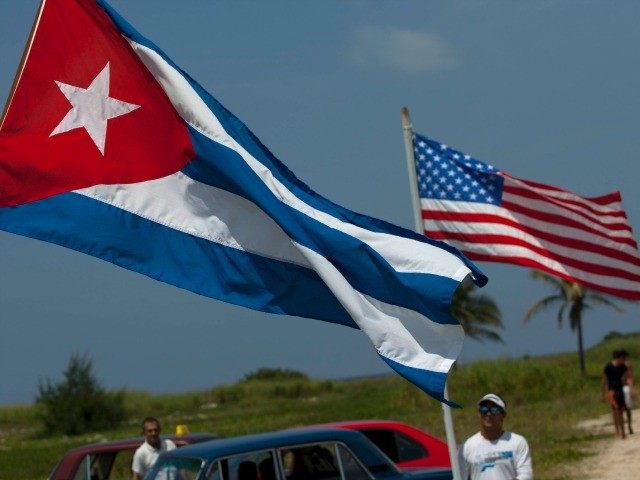The D.C. lobbyist collective Engage Cuba is promoting a letter, allegedly signed by “small business” entrepreneurs in Cuba, urging President-elect Donald Trump not to undo his predecessor Barack Obama’s favorable diplomatic overtures to the Castro regime.
“Additional benefits to increase travel, commerce, and investment, including working with Congress to lift the embargo, will benefit our businesses, the Cuban people, and the national interests of the United States,” the letter reads, referring to the President-elect as “a successful businessman” and asserting that “we are sure you will understand the importance of the economic commitment between our two nations.”
“We hope to take advantage of all the openings your administration will create in the Cuban private sector and the Cuban economy,” it concludes.
Six Congressmen, five Democrats, promoted the letter with a press conference Wednesday; Reuters reports that a “U.S. company that arranges trips to the island” organized the signature-collection effort with the alleged Cuban entrepreneurs.
Engage Cuba, the lobbyist group behind the letter, has close ties to individuals within the failed Hillary Clinton presidential campaign, particularly campaign chairman John Podesta. In emails leaked by the organization WikiLeaks, Engage Cuba officials appeared to regularly invite Podesta to “cool” parties “worthy of someone like you” and, on one occasion, successfully convinced Podesta to arrange for Clinton to deliver a speech promoting further business ties to the Castro regime in Miami. The move ultimately backfired; Trump won Florida in part as a result of the Cuban-American vote turning out against the Democrats.
Trump has proven extremely sensitive to the concerns of the pro-freedom Cuban exile community and its allies in the United States. Despite his dealings in the hotel industry, Trump has not brought his real estate business to Cuba and has repeatedly vowed as a candidate to undo President Obama’s “normalization” process, which has resulted in an unprecedented wave of Cuban refugees taking to the high seas to reach the United States and a new wave of violent repression of Cuban dissidents.
As president-elect, Trump responded to the death of dictator Fidel Castro by calling him a “brutal dictator” and has filled his transition team with prominent members of the Cuban exile community in the United States, as both transition officials and advisers.
The letter is the latest in a nascent campaign to urge Trump to reconsider on his pro-democracy, anti-communist stance regarding Cuba’s government. Businesses seeking to negotiate with the Castro regime for profit have not desisted in treating Obama’s policies as irreversible since even before Trump’s election. “We remain optimistic that the progress we have made in Cuba will continue,” Carnival Cruises, which imposed an illegal ban on Cuban-Americans boarding their cruises to Havana to appease the Castro regime, said in a statement.
“We are full steam ahead to begin service to Havana this week,” an American Airlines spokesman said in late November, when the airline’s first flights to Havana would begin. “We are proud to be the leading carrier between the U.S. and Cuba.”
Some in the business community have been more direct in their attitudes towards continued business with the Castro regime. “We’ve now gotten to a point where we have an embassy and we have commercial flights that are starting [and] US companies managing hotels [in Cuba]. To unwind all of that and go back to the Cold War would be a shame,” former Kellogg chief executive Carlos Gutierrez, for example, told the Financial Times in November. Gutierrez’s statements appeared in the publication before Fidel Castro’s death, after which a high-level Kellogg official praised Castro on Twitter.
Many who support continued economic engagement with Cuba highlight only the benefits that would come to large American corporations should they do business there. “We want them sleeping in American hotels. We want them to eat hamburgers from America,” Democratic Senator Amy Klobuchar said this week. With few exceptions, many who support engaging Cuba do not address the measures dictator Raúl Castro has taken to ensure the communist government will benefit from these deals, like passing a law that strips a Cuban employed with a foreign corporation of 92 percent of his or her salary and doubling the price of state-owned hotels following President Obama’s “normalization” speech.
In a notable exception, CUNY professor Ted A. Henken highlights the existence of an “internal embargo” as a challenge in opening up Cuba’s economy in a recently CNBC column. Those seeking to own small businesses under Communist Party rule, he writes, “[are] under no illusions that the Cuban government would be fully lifting its own counter-productive ‘auto-bloqueo,'” and are enduring restored price controls and bans on access to wholesale markets that government-run businesses rely on.
In a sign that Trump’s adversarial attitude towards the Cuban regime may force the communists to reconsider some aspects of their totalitarian regime, a recent Miami Herald report cites businessmen with ties to Cuba as stating that their government contacts fear Trump. The newspaper quotes one businessman with ties to Cuba describing government officials as “cagados” (“shitting themselves”).
“The contacts they’ve spent years cultivating had the ear of President Barack Obama’s administration. No one close to Trump is — at least publicly — an advocate for their cause,” the newspaper notes. Instead, Trump has embraced the Cuban exile community primarily concentrated in Florida, which strongly opposes appeasing the Castro regime.
To maintain the benefits of Obama’s diplomatic overtures, Havana may have to turn to a different neighbor to the north. The Canadian Prime Minister, who praised dictator Fidel Castro as a “remarkable leader” after his death, vowed to continue doing business with “my friend” Raúl Castro in the event that Trump pressured Canada to consider Cuba’s human rights record. “Elections in the United States will not change the strong relationship, which is one of partners and friends, between Canada and Cuba,” Justin Trudeau said in Havana in November.

COMMENTS
Please let us know if you're having issues with commenting.